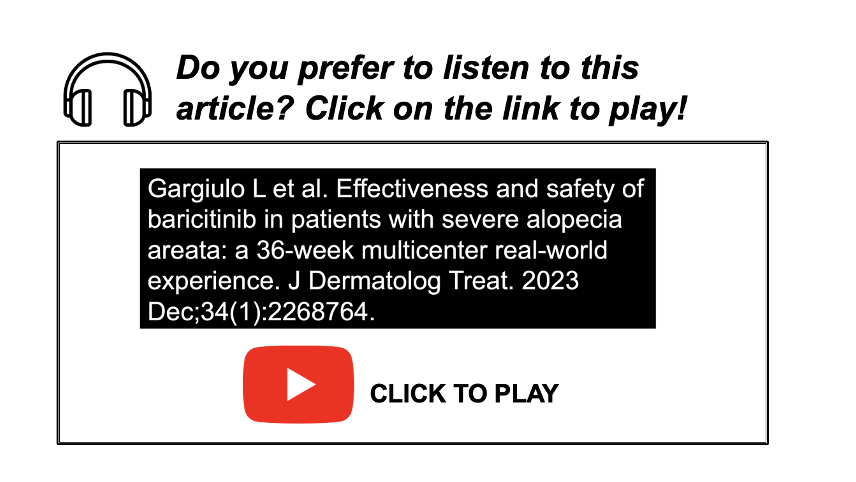Real World Data with Baricitinib for Alopecia Areata:
New Study Provides "Real World Data” with Baricitinib for Severe Alopecia Areata
Baricitinib was FDA approved for severe alopecia (more than 50 % loss) in June 2022. 4 mg of baricitinib helped about 35.9%−38.8% of patients with severe AA (SALT >50) achieve a SALT score <20 after 36 weeks. We reviewed these studies in the past. A link is provided below.
In a new study, authors sought to assess the effectiveness and safety of baricitinib for AA in adults with severe alopecia areata, defined as a Severity of Alopecia tool (SALT) ≥50 (more than 50% scalp hair loss).
Patients received baricitinib 4 mg once daily, and they were evaluated at weeks 0, 16, 24, and 36.
Results
There were 50 patients in this study. Patients were from four dermatology Units in Milan, Italy. At baseline, the mean SALT score was 84.38 and 30 patients (60%) had a very severe AA (SALT 95–100).
In this study, only a small proportion of patients completed the full 36 weeks so far. Thirty-four patients completed 16 weeks of treatment to date, and 26.5% of them achieved a SALT ≤ 20. There were 24 patients who completed 24 weeks of therapy and 38.1% achieved a SALT<20. There were just 11 patients who completed 36 weeks of therapy. At week 36, the percentage having a SALT<20 was 54.6%.
Early vs Gradual vs Late Responders
The authors of this study used the term early, gradual and late responder to mean something different than used in the King et al paper. In this study, a responder was not just someone who started to grow hair (ie a SALT30) but rather was someone who achieved a SALT <20.
The study therefore looked at the proportions who were early responders (achieved a SALT<20 in the first 12 weeks), gradual responders (achieved a SALT<20 from 12 to 36 weeks), and late responders (achieved a SALT<20 in after 36 week),
Among all patients who achieved a SALT<20 response, 15.8% of the patients were considered early responders, 68.4% were gradual responders and 15.8% were late responders.
The most reported side effects were hypercholesterolemia (10 patients) and creatine phosphokinase elevation.
Conclusions and Comments
This is an interesting study. Real world data are also important to publish because clinical trials are not always representative of what goes on in the real world. Clinical trials are highly controlled and have certain inclusion and exclusion criteria. Therefore what goes on the real world is important.
The authors found pretty similar data to the BRAVE AA trials. 54 % of patients had a SALT <20 by week 36. They only had 11 patients in this group so clearly one patient can skew the number a lot. Here, there were 6 of 11 with a SALT less than 20. Clearly small numbers can skew things a lot.
The data are important because it reminds us that some patients do respond really early to baricitinib but the vast majority have responded by week 36.
The study is small with only 11 patients in the week 36 group. But nevertheless it’s helpful data for us to be generating real world data too.
Longer studies will be helpful as the baricitinib trial data suggests that some patients start losing benefits between week 52 and 104. So I would encourage the authors to continue to follow these patients.
Similarly – real world data with side effects are equally important. Changes in blood counts, shingles, COVID infections, blood clots, heart attacks are all important to document.
In fact, all authors worldwide should be aware that real world data is extremely important and an RCT leading to FDA approval does not mean the case for baricitinib use in AA is signed and sealed.
A final point is that we are clearly heading into a bit of a problem about terminology. Early responders and gradual responders in this study are those that achieve a SALT score less than 20 (80% regrowth). Early and gradual responders in the King et al study are those that achieve a 30 % reduction in SALT score. At some point in the future, there is going to need to be some kind of a consensus on how we use various terms.
REFERENCE
Luigi Gargiulo et al. Effectiveness and safety of baricitinib in patients with severe alopecia areata: a 36-week multicenter real-world experience. J Dermatolog Treat. 2023 Dec;34(1):2268764.
Krauss A et al. Why all randomised controlled trials produce biased results. Ann Med. 2018 Jun;50(4):312-322.
This article was written by Dr. Jeff Donovan, a Canadian and US board certified dermatologist specializing exclusively in hair loss.


